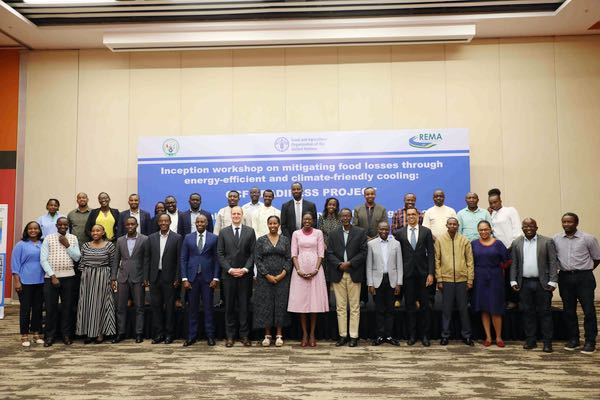
The Government of Rwanda, through the Rwanda Environment Management Authority (REMA), the Food and Agriculture Organization (FAO) and the Green Climate Fund (GCF), have launched two projects to advance energy efficiency and sustainable cooling in Rwanda.
Both projects will be implemented using funds mobilised by the Government of Rwanda under a GCF readiness project and a FAO technical cooperation programme.
The support from FAO and GCF will contribute to the establishment and operationalisation of the Africa Centre of Excellence for Sustainable Cooling and Cold-Chain (ACES).
Speaking at the launch, FAO Rwanda Country Representative, Coumba D. Sow underscored the need for collaboration to make these projects a success.
“The partnership between REMA, FAO and the Africa Centre of Excellence for Sustainable Cooling and Cold Chain aims to contribute to the reduction of post-harvest losses in Rwanda. Today’s launch is a centrepiece of the project implementation as it invokes collaboration amongst different stakeholders, including representatives of key institutions, development partners, private sector players, and technical experts’’ she noted.
The GCF funds will focus on mitigating food losses through energy-efficient and climate-friendly cooling, while the FAO support will provide technical assistance and capacity building for cold chain development in Rwanda.
The funding has been mobilised to support existing activities being implemented by the Government of Rwanda and the United Kingdom, as well as the UN Environment Programme and a consortium of universities from both countries which led to the establishment of the Africa Centre of Excellence for Sustainable Cooling and Cold Chain (ACES), which is hosted by the University of Rwanda.
The GCF support will contribute to the Rwanda Cooling Initiative, through which Rwanda developed ambitious Minimum Energy Performance Standards, energy labels and an online licensing system for monitoring the importation of air conditioners and refrigerators.
The funding will also support an ongoing initiative with local banks and appliance vendors that aims to increase the uptake of efficient cooling solutions.
The Rwanda Environment Management Authority is promoting sustainable cooling through a comprehensive awareness campaign and capacity building for technicians, customs officers, and others on the trade of Ozone Depleting Substances, safety, energy efficiency, and other aspects.
“Making cold-chain part of Rwanda’s critical infrastructure is key to reducing food loss, improving livelihoods, accelerating economic growth and meeting our Vision 2050 and international commitments under the Kigali Amendment to the Montreal Protocol and the Paris Agreement. The support from the GCF, FAO and UNEP will ensure the success of the Africa Centre of Excellence for Sustainable Cooling and Cold-Chain,” said Juliet Kabera, Director General, Rwanda Environment Management Authority.
Both projects will not only contribute to reduce post-harvest losses, they will also contribute to increase agricultural exports and nutritious food, increase skilled labour and student exchange programs, create jobs, improve livelihoods and reduce greenhouse gas emissions among many more.
The Africa Centre of Excellence for Sustainable Cooling and Cold-chain (ACES) was established in 2020 by the Governments of Rwanda (GoR) and the United Kingdom, the United Nations Environment Programme’s United for Efficiency (UNEP U4E) initiative, the Centre for Sustainable cooling, and a range of academic institutions.
The Centre is hosted by the University of Rwanda (UR) at Rubirizi Campus. ACES is pursued through the Rwanda Cooling Initiative (R-COOL), a joint program of Rwanda Environment Management Authority (REMA) and UNEP U4E to advance the country’s sustainable development priorities and ambitions for enhanced collaboration on sustainable cooling throughout the continent.
The ACES offers a compelling opportunity across the spectrum: from the largest multinational companies and leading investors to SMEs and local start-ups, from accomplished academics to budding students, major supermarkets and agribusinesses to small-shareholder farmers and cooperatives, and political leaders from the international stage to the village-level, and beyond. (End)
